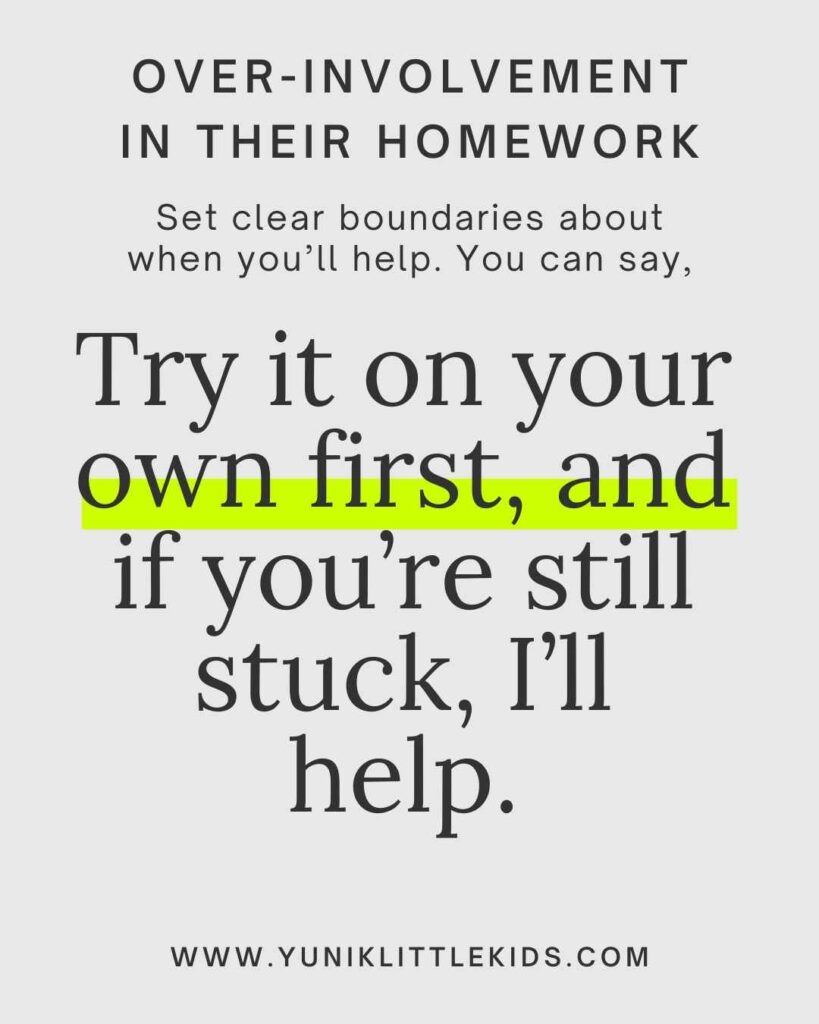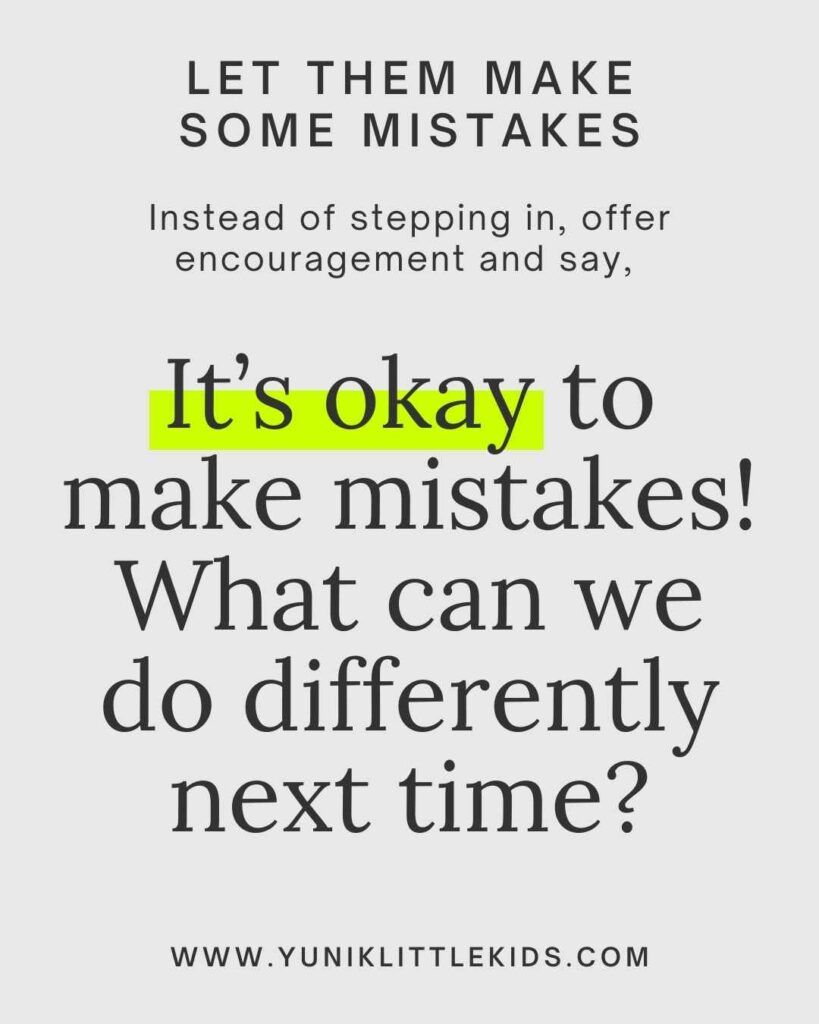Signs You Are Micromanaging Your Child (+ How to Stop It)

Inside: Are you micromanaging your child without realizing it? Discover the signs and learn how to stop while empowering your child to build confidence, independence, and problem-solving skills with these practical tips.
Have you ever felt the need to step in and “help” your child with something they could probably handle on their own?
Maybe you find yourself correcting every little detail of how they dress, play, or do their homework. If so, you’re not alone.
As parents, our instincts often push us to protect, guide, and ensure our children succeed.
But sometimes, those good intentions can drift into micromanaging. Micromanaging happens when we control or overly involve ourselves in tasks, decisions, or activities that our child can handle independently or learn to manage with guidance.
This micromanaging leaves little room for your child to develop independence, confidence, and problem-solving skills.
In this post, we’ll explore the signs of micromanaging and, more importantly, how to stop it while still being a supportive parent.
Table of Contents
10 Signs You Might Be Micromanaging Your Child
Here are 10 signs that you may be micromanaging your child, along with detailed explanations and actionable steps to stop.
1. Constantly Correcting Their Actions
Ever find yourself fixing every little thing your child does, from how they hold a pencil to how they put their shoes on? While your intention is to guide, overcorrecting can make them feel like they’re always doing something wrong.
Try to take a step back and ask yourself if the correction is truly necessary.
Focus on their effort rather than the result. For example, if they’re trying to make their bed, let it be imperfect and praise their initiative instead of fixing it.
2. Preventing Them from Making Mistakes
You may intervene to avoid any potential failure. You may be stopping them from trying a puzzle because it seems too hard or taking over a craft project to “do it right.”
Just let them try, even if it means they might fail. Mistakes are how kids learn resilience and problem-solving.
Offer encouragement like, “It’s okay if it’s tricky. Keep trying, and I’m here if you need help.”
3. Over-Scheduling Their Time
Your child’s day is packed with activities you’ve planned – homework, sports, music lessons, and everything from wake-up to sleep time.

Don’t you think it leaves them little time to explore, play, or make decisions about how to use their free time?
While planning a day is totally fine, squeeze in some unstructured time where your child can decide what to do.
Encourage activities like free play, reading, or creative projects. You can even involve them in planning by asking them, “What would you like to do this afternoon?”
4. Completing Tasks They Can Do Themselves
You tie their shoes, pack their backpack, or clean their room, even though they’re capable of doing it themselves. This is definitely micromanaging.
Yes, you might be in a rush, but try to start with small steps. Encourage independence by teaching them how to handle these tasks.
For example, show them how to tie their shoes step by step and let them practice, whenever possible even if it takes longer. Gradually increase their responsibilities as they build confidence.
5. Taking Over Their Creative Projects
Was there a time when your child starts drawing a picture, and you jump in to “improve” it or suggest what they should draw next? Then it is a sign you are micromanaging them.
It is crucial that you let their creativity shine without interference. Offer encouragement like, “I love how unique your picture is!” rather than adding your ideas. If they ask for help, give suggestions but let them decide how to proceed.
6. Over-involvement in Their Homework
Ok. Let’s be honest. Most of us do this. Even worse, we actually think we NEED to do this.
We sit next to them for every assignment, correcting mistakes as they go or even doing the work for them when they struggle.

We think they need to be perfect in their homework and get a star or a good mark or whatever.
But, doesn’t that rip the actual purpose of the homeworks – the practice?
Set clear boundaries about when you’ll help. For instance, say, “Try it on your own first, and if you’re still stuck, I’ll help.”
Encourage them to make an effort before stepping in, and resist the urge to fix every error.
7. Struggling to Let Them Choose
You find it hard to let your child make decisions, even small ones, like choosing their outfit or picking a snack. This is micromanaging.
Start by giving them options within a framework. For example, say, “Do you want to wear the red shirt or the blue one?”
As they get more comfortable, expand their choices and trust their judgment, even if it’s not what you’d prefer.
8. Fixing Social Conflicts for Them
When your child has a disagreement with a friend, you step in to resolve it instead of letting them navigate the situation. We all do this. Again, we think this is what we NEED to do.
But there is a better way to do it instead of micromanaging.
Stand by them, guide them through the process rather than solving it for them. Ask, “How do you think your friend feels? What could you say to make things better?”
Role-play potential solutions with them so they feel prepared to handle conflicts on their own.
9. Feeling the Need to Monitor Everything
You feel anxious when you’re not directly overseeing their activities, whether it’s a playdate, homework, or chores.
I know how it feels. I literally can’t stand when my child is not in my eye sight. But that’s definitely not a good way to go about life. I know it and I am trying to change it.
We can practice giving them space in low-stakes situations.
For example, we can let them play independently in another room while you’re nearby. Gradually extend the time and distance as your confidence, and theirs, grows.
10. Expecting Perfection
You’re often disappointed when your child’s efforts don’t meet your expectations, whether it’s their schoolwork, a chore, or their behavior.
Shift your focus from the outcome to the effort. Celebrate their progress by saying, “I can see you worked really hard on this!”
Always know that, kids are learning, and perfection isn’t the goal, growth is.
Why Micromanaging Can Be Harmful?
While it’s natural to want the best for your child, micromanaging can have unintended consequences.
- Lack of Confidence: Constant oversight can make children doubt their abilities.
- Fear of Failure: They might avoid challenges out of fear of making mistakes.
- Dependency: Children may become overly reliant on you for decision-making and problem-solving.
8 Things You Must Do To Stop Micromanaging Your Child
If you recognize some of these signs in your parenting, don’t worry, it’s never too late to make a change. Here are some actionable steps to help you shift from micromanaging to empowering your child.
1. Recognize When You’re Overstepping
Just pay attention to situations where you’re overly involved.
Are you stepping in to fix small issues that your child could figure out on their own?
Accept these moments without judgment. Don’t justify why you did it. Everyone knows you have a good intention at heart. But, it is not what is needed.
Self-awareness is the first step to change.
2. Let Them Make Age-Appropriate Decisions
Give your child opportunities to practice decision-making.
Start small,
- Let them choose what to wear, even if it’s mismatched.
- Allow them to decide between two snacks or activities.
These choices teach them independence and show that their opinions matter.
3. Let Them Make Some Mistakes
It’s hard to watch your child struggle or fail. But aren’t mistakes are valuable lessons?
Instead of stepping in, offer encouragement and say, “It’s okay to make mistakes! What can we do differently next time?”
This builds resilience and problem-solving skills.

4. Set Clear Expectations, Then Step Back
If your child has a task, like tidying their room or completing homework, set expectations upfront and let THEM handle it.
Avoid hovering. Instead, offer support only if they ask for it.
5. Focus on Progress, Not Perfection
Instead of correcting every small detail, celebrate your child’s effort and growth.
Instead of saying, “You didn’t fold the clothes right,” try, “Great job folding your clothes! You’re getting better at it.”
Positive reinforcement builds confidence and motivation.
6. Don’t Solve For Them. Guide them.
When your child faces a challenge, resist the urge to jump in with solutions.

Instead, ask guiding questions,
- “What do you think we should do?”
- “How can we fix this together?”
This empowers them to think critically and develop their own solutions.
7. Give Them Space to Explore
Children need room to experiment, make mistakes, and figure things out independently.
Create opportunities for them to take charge of their own activities, like setting up a simple craft project or organizing their toys.
If you are worried about giving them the full control, offer a safe controlled environment. This place can have only the activities or items that you approve of. Such idea can reduce the need for saying “No” and letting your child feel incharge.
8. Practice Patience
Parenting takes patience, especially when you’re stepping back.
Remind yourself that letting your child struggle a little is part of the process. Trust that they are capable of growing through these moments.
Final Thoughts
Micromanaging often comes from a place of love and a desire to help our children succeed. But by stepping back, giving them space to try, and focusing on their efforts, we empower them to grow into confident, capable individuals.
The next time you feel the urge to step in, pause and ask yourself: “Does my child really need my help, or can they figure this out on their own?”
You might be surprised by how much they’re capable of and how proud they feel when they achieve it.




